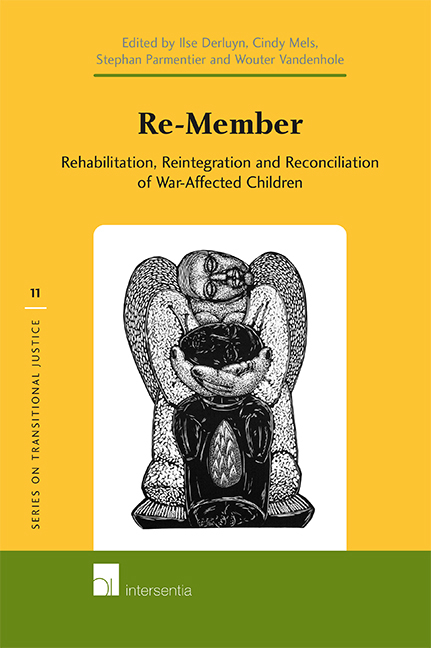Book contents
- Frontmatter
- Preface
- Foreword
- Contents
- Introduction: Children Affected by Armed Conflict at the Intersection of Three Fields of Study
- PART I SETTING THE SCENE: THREE DISCIPLINARY PERSPECTIVES
- PART II LESSONS LEARNT FROM CURRENT PRACTICES AND APPROACHES
- PART III EXPLORING RESOURCES THROUGH EMPIRICAL RESEARCH
- PART IV LOOKING BACK, REACHING FORWARD
- About the Editors
- About the Authors
7 - Rehabilitating Separated Children Through Holistic, Community-Based Models
Published online by Cambridge University Press: 20 January 2021
- Frontmatter
- Preface
- Foreword
- Contents
- Introduction: Children Affected by Armed Conflict at the Intersection of Three Fields of Study
- PART I SETTING THE SCENE: THREE DISCIPLINARY PERSPECTIVES
- PART II LESSONS LEARNT FROM CURRENT PRACTICES AND APPROACHES
- PART III EXPLORING RESOURCES THROUGH EMPIRICAL RESEARCH
- PART IV LOOKING BACK, REACHING FORWARD
- About the Editors
- About the Authors
Summary
INTRODUCTION
Since the year 2000 more than 15,000 separated children1 have entered the UK seeking asylum. Many of these children and young people have fled war, enduring traumatic events and losses. Once in the UK, they face secondary stresses such as navigating welfare and legal systems that are often incoherent, inconsistent and unsettling. As a result, the already complex process of rehabilitation in exile is made even more difficult.
In response to the issues that young separated refugees face, Dost, meaning friend, was set up nine years ago. Dost is based within the communal space of the Trinity Centre, a community centre and independent charity in East London; it is used by individuals of all ages and backgrounds for education, recreational purposes and support services. Within this community setting Dost aims to provide psychosocial assistance to vulnerable children, including young refugees separated from their families and fleeing violent conflict. A holistic approach is necessary as the needs of separated children, like those of all children, are multiple and interdependent. To this end, Dost provides education, play and youth work, and advice and advocacy (casework).
The first section of this paper will investigate in depth how Dost's flexible casework model therapeutically benefits young separated refugees who are new to the UK. A central aim is to elucidate the subtle multiplicity of factors needed to aid the psychological recovery and social rehabilitation of war-affected children. The paper will go on to explore how the wider framework of Dost and the Trinity Centre strengthens the casework model's ability to provide psychosocial support. Dost's other integral services of education and play offer young separated refugees the opportunity to access community and natural healing processes. Moreover, the relationship that children and young people are able to build within the Trinity Centre's space, as well as the intergenerational interaction that can take place within the community context, is fundamental to social rehabilitation processes.
This paper makes use of anecdotal evidence accrued over the past three years working with war-affected children separated from their families. Quotes from young people are from semi-structured interviews conducted for the purposes of an ongoing piece of research relating to belonging and community.
- Type
- Chapter
- Information
- Re-MemberRehabilitation, Reintegration and Reconciliation of War-Affected Children, pp. 185 - 200Publisher: IntersentiaPrint publication year: 2012

